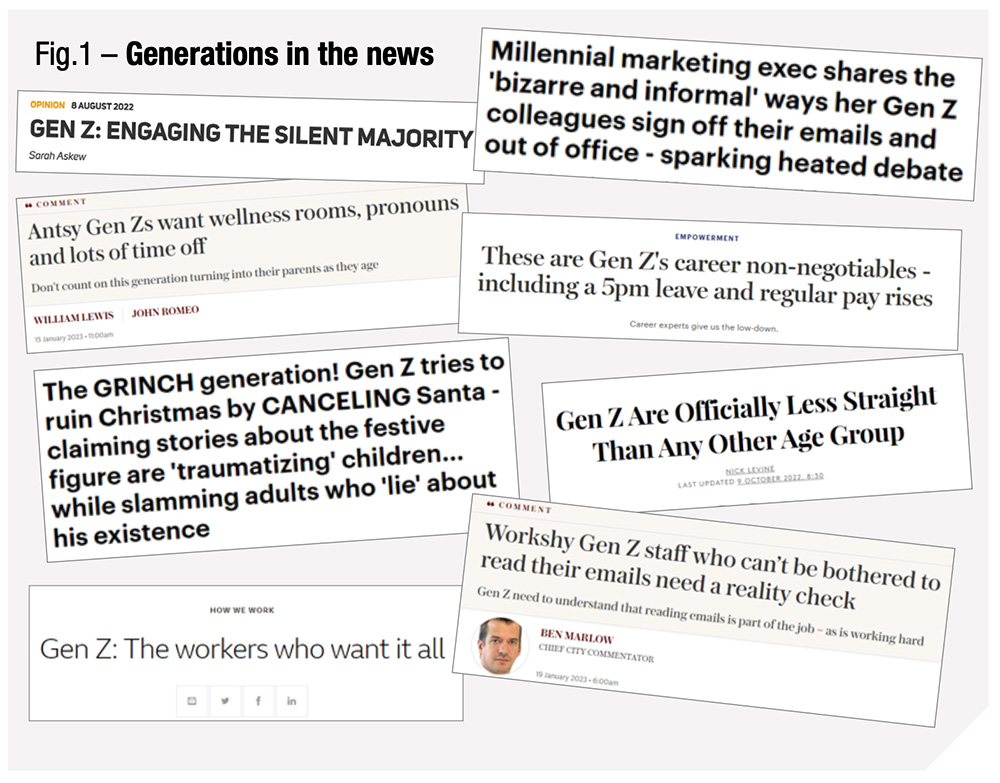

We need to talk about generations - Understanding generations
No longer. Millennials are firmly out of fashion these days. The buzz now centres on Generation Z, born post-1995 and now entering the workforce in significant numbers.
 Yet the rhythm of the chatter about generations remains the same. Just like the millennials before them, articles about Gen Z being “a majority”, demanding “fundamentally different things” at work from older generations, or that their views on the environment are “completely different to everyone else” are in abundance.
Yet the rhythm of the chatter about generations remains the same. Just like the millennials before them, articles about Gen Z being “a majority”, demanding “fundamentally different things” at work from older generations, or that their views on the environment are “completely different to everyone else” are in abundance.
But decades of research show that much of what passes as startling new insights about generational change can be misleading or wrong.
Let’s take as an example the line about Generation Z already being a “new majority”. A quick look at the actual data reveals that, even if we included ALL adults in the world today aged 0-15 in our categorisation, we only get to 40% of the population!
 And to continue with today’s prevailing Gen Z narrative, this is a group who are often made out to be obsessed about ‘brand purpose’ and climate change – but it’s actually older people that are more likely to boycott brands. Meanwhile, our Ipsos Global Trends research tells us that all age groups are equally worried about climate change. What young people are more worried about are those very immediate issues like low incomes and housing.
And to continue with today’s prevailing Gen Z narrative, this is a group who are often made out to be obsessed about ‘brand purpose’ and climate change – but it’s actually older people that are more likely to boycott brands. Meanwhile, our Ipsos Global Trends research tells us that all age groups are equally worried about climate change. What young people are more worried about are those very immediate issues like low incomes and housing.
 Often pundits and commentators make two mistakes. First they get confused between genuine cohort effects which distinguish a generation uniquely, and “life stage effects” and “period effects” which all generations pass through - e.g. young people of all generations tend to be more likely to go out, exercise etc than older people. Second the whole idea that everyone born across a 15-year period will be identical, or very similar, itself does not work beyond some basic generalisations. This is what we unpick here.
Often pundits and commentators make two mistakes. First they get confused between genuine cohort effects which distinguish a generation uniquely, and “life stage effects” and “period effects” which all generations pass through - e.g. young people of all generations tend to be more likely to go out, exercise etc than older people. Second the whole idea that everyone born across a 15-year period will be identical, or very similar, itself does not work beyond some basic generalisations. This is what we unpick here.
Better analysis can help us all separate the myths from realities.
In this spirit, we hope this report provides ideas, information and even some provocation. We’re looking forward to discussing our research – and its implications – with you.
Happy reading!
Key learnings
A lot of what is written about generations is misleading or wrong
Yet using a generational lens is a really effective way of understanding how and why societies and consumers change. The real task being to separate three effects that explain changes among consumers: lifecycle effects, period effects and cohort effects. If we do that, we can understand the present and predict the future in a more meaningful way.
Where and when you were born matters
People born the same year but in different places will often have had very different experiences and trajectories. Consider two people respectively born in China and the United States in 1973. The formative experiences of today’s 50-year-olds, growing up in the 1980s, were rather different. Any assertions and generalisations we make about “generations” do need to be considered carefully.
We need to get ready for population decline
Thirty-six countries are losing population already, and more are set to follow them. Birth rates are now below replacement ratio pretty much everywhere. Urgent questions need to be asked around the economic consequences of ageing: the impact of fewer workers on the tax receipts that support public services, the impact of fewer consumers on spending power and the impact of fewer creative minds on our innovation pipelines.
It’s time to ask ourselves some hard questions
- Do we know enough about how to market to the over 50s?
- What order of importance should we really be giving to Gen Z?
- Just what’s happening with Millennials these days?
- Are Gen X about to take over the world?
- What are the specific dynamics of the different generations in my country?
- Do the terms that have become so widely used actually work here?


![[Webinar] KEYS: What can we learn from what happened in 2025?](/sites/default/files/styles/list_item_image/public/ct/event/2025-12/keys-webinar-what-happened-in-2025-carousel.webp?itok=1gJKCCxx)
![[Webinar] KEYS: THE MIDDLE CLASS: In Crisis?](/sites/default/files/styles/list_item_image/public/ct/event/2025-10/middle-class-family-dinner-food-carousel.webp?itok=iD1QyX8n)
![[Webinar] KEYS: Global Trends - The Uneasy Decade](/sites/default/files/styles/list_item_image/public/2025-09/image/minisite/keys0925.png?itok=3oAiYcxm)